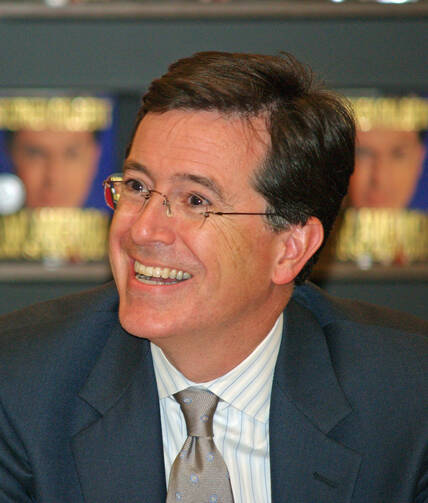A fake news anchor on a channel known for comedy is a greater source of (true) information than news channels with real reporters? Apparently.
For the last few years, many have claimed to get their news from "The Daily Show" and "The Colbert Report," and now there's more evidence to support it.
According to a study performed by the Annenberg Public Policy Center of the University of Pennsylvania and published in the journal Mass Communication and Society, Stephen Colbert's "The Colbert Report" might inform as much as it humors. According to Annenberg's press release:
The study, published online in Mass Communication and Society, tested “The Colbert Report” against CNN, Fox News, MSNBC, and broadcast nightly news, as well as talk radio and newspapers as sources of political information. The study, “Stephen Colbert’s Civics Lesson,” was based on phone survey data from 1,232 adults 18 years or older who were interviewed between Dec. 13, 2012 and Dec. 23, 2012.Watching “The Colbert Report” served as “an extended civics lesson,” the researchers said. The show not only increased people’s perceptions that they knew more about political financing, but significantly increased their actual knowledge, and did so at a greater rate than other news sources. Other activities that increased knowledge about super PACs and 501(c)(4)s to a lesser degree included reading a daily newspaper, listening to talk radio, and watching Fox News.
I should add that I don't know enough about this study to draw too many conclusions about the superiority of "The Colbert Report" relative to, say, NPR, the New York Times or the Wall Street Journal. I think it's fair to say that, however helpful the "Report" is in educating audiences, a person who watched only Colbert's show to learn about world news wouldn't know as much, or as much in depth, as the reader of the Times or the Journal (assuming the latter reader reads more than a few articles and opinion pieces). Colbert is brilliant, but he is an entertainer first. The satire and the comedy dilute the purity of the information. His show does not provide (and, in fairness to him, does not intend to provide) an objective, varied look at issues.
However, Colbert finds creative ways to illuminate subjects that people otherwise wouldn't know about or would likely find too boring to spend time on. And Colbert gives air time to people who possess all kinds of perspectives, whether religious, political, philosophical and otherwise. His interviews veer into substantive discussions and highlight important social, cultural, and religious divisions. Put simply, and unlike all other late night talk shows, Colbert engages issues that matter.
Theology teachers, particularly Catholic theology teachers, have known this for some time. A few years ago, in what is still probably my most widely read essay (a piece titled "Colbert's Cloak and Dagger Catechesis," at Patheos.com), I documented the numerous ways that Colbert effectively talks about and teaches major Catholic themes -- everything from Adam and Eve, to the debate over faith and evolution, to the existence of Jesus. (For a more recent treatment of the subject, see Patrick R. Manning's article in America, "Truth and Truthiness.") When it comes to religion in popular media, few resources are as simultaneously edifying and funny as Colbert's show.
Now, with this latest study from Annenberg, it appears Colbert is not simply a talented catechist, but more broadly, a talented teacher. Through skits, interviews, and commentary, and through the filters of humor and satire, people learn -- at least with some subjects. Campaign finance, government, theology . . . but what about Calculus or some other area of advanced mathematics? Forget "Better Know a District"; how about "Better Know a Proof"? Think of the possibilities...








